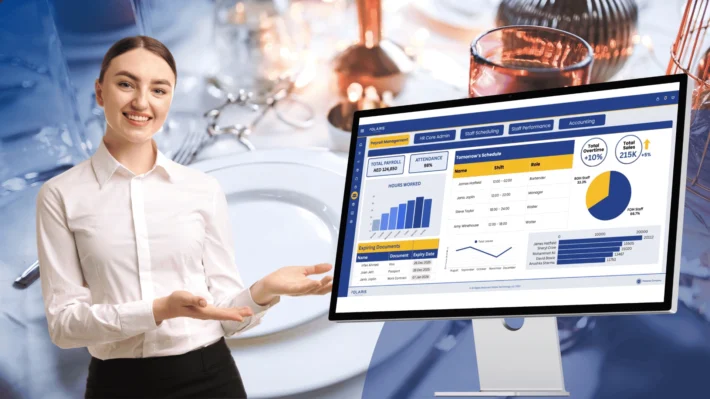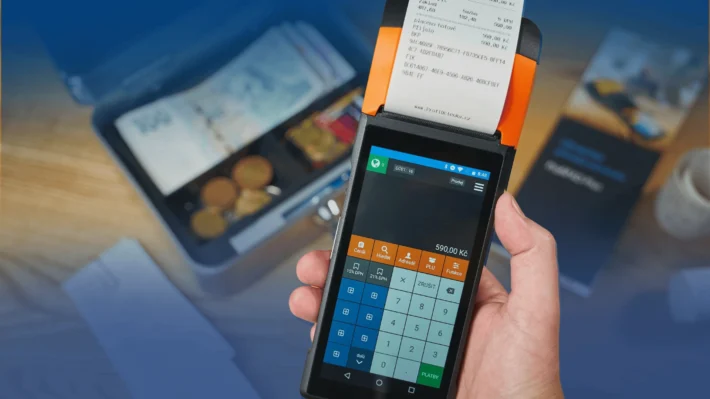Why Juggling Multiple Systems Is Slowing Down Your Restaurant

Anyone working in the F&B industry knows that in this sector efficiency is key. From staff management to handling daily tasks like order taking, food preparation and serving, inventory management, purchase, or supplier management, everything needs to run smoothly for achieving maximum efficiency. While nowadays these individual business areas can be handled by a single ERP solution, many restaurateurs are still using different systems to manage point of sale (POS), accounting, inventory, human resources, and more.
Although these systems may serve specific functions, the reality is that they can hinder your restaurant’s growth and efficiency, used separately. Here’s a look at the disadvantages of relying on multiple systems and how an all-in-one restaurant ERP solution can turn these disadvantages into opportunities.
1. Data Discrepancies and Errors
Managing multiple systems often leads to data discrepancies. Information entered into one system may not sync accurately with another, resulting in errors that can affect inventory management, sales reporting, and financial accounting.
One of our clients, a restaurant manager at a full service restaurant, shared his experience regarding this disadvantage of using multiple systems to manage restaurant operations: “Before using Polaris Technology, we needed to gather all data from sales, match and tally them, submit them to the finance, and there was always a gap. Now using Polaris is a one-stop-point.” (Amjad Abdi, General Manager, Somun Restaurant).
Opportunity: A restaurant ERP system consolidates all your data into a single platform, ensuring consistency and accuracy. This means you can trust the insights you gain from your sales and financial reports, leading to better decision-making.
2. Inefficient Workflows
Switching between different software can disrupt workflows, making it difficult for staff to stay focused. Time spent navigating multiple interfaces takes away from time that could be used to enhance customer service or streamline operations. Using a system to record sales (POS), and a different system for accounting, inventory, purchase, or HR limits your restaurant business, because some reports can’t be shared between the systems, hence hindering visibility on what is really happening inside your business.
In addition, it is also time consuming, leading to work duplication and considerable manual effort, which can result in errors, frustration, and missed opportunities for growth. When using multiple systems to run your restaurant looks more like trying to solve problems that arise from these systems, while you should be focusing on growth, having a single system that covers all your operations smoothly.

Having worked directly with Polaris ERP system, the Head Pastry Chef at Honestry, AshirAi Kumbula, mentions that one of the benefits of using this solution is that it helps to reduce time dealing with suppliers’ orders, or inventory management: “Polaris helped us to manage our inventory to see if it’s tally with what is in the system, and we can now check and order everything through the system, we don’t have to individually call our suppliers, which is time efficiency.”
Opportunity: With an all-in-one ERP solution, your team can access everything they need from one interface. This increases efficiency, allowing employees to dedicate their time to serving customers and improving their experience.
3. Increased Operational Costs
Maintaining multiple systems often means incurring higher operational costs – from subscription fees to training and support for various platforms. These costs can add up, cutting into your profit margins. What’s more, these individual systems that work in silos, only offer the price per user. When utilized across the entire organization, by multiple users, the cost can rise up considerably.
Opportunity: By investing in a comprehensive restaurant ERP system like Polaris Technology, you eliminate the need for multiple subscriptions, and reduce training time. The subscription comes with a package of 10 or more users, depending on the selected plan. This not only saves money but also enhances overall operational efficiency.
4. Limited Insights
When data is spread across various systems, gaining comprehensive insights becomes challenging. Restaurant owners may struggle to get a clear picture of performance metrics like sales trends, cash flow, and inventory turnover.
First, retrieving one report from accounting and then matching it, or comparing against another report from purchase, or from sales takes time to first generate all different reports. Second, the formats of the reports might not always align, as they would be generated in the format that each system is supporting. This may require manual work to align all reports, which can lead to errors. Not only is this process time-consuming and prone to errors, but it also fails to provide actionable insights for making informed business decisions.
Opportunity: Polaris Technology provides detailed insights into sales, profits, losses, and cash flow across all locations or branches. With access to historical data, you can compare performance against previous months or years, allowing you to make informed strategic decisions. Moreover, Polaris ERP’s AI-embedded technology provides actionable insights and recommendations that you can use to boost profitability, reduce costs, increase operational efficiency and grow your business.
5. Difficulty in Managing Multiple Locations
For restaurant chains, managing multiple locations can be particularly daunting when using different systems. Each location may have its own set of data, making it hard to implement standardized practices and measure overall performance.
Mr Ali Payandenick, CEO of Polaris Technology says: “When restaurants want to expand, oftentimes they lose control. You open a second or third branch, but without the right systems, you’re relying on managers to run it – and you lose visibility. With a restaurant ERP, you can track all branches in one place, compare performance, and stay in control as you grow. Scaling doesn’t have to mean chaos.”
Opportunity: An ERP system centralizes data from all branches, allowing you to manage operations evenly, without variations. This facilitates better decision-making and performance tracking across your entire brand.
The Polaris ERP Advantage
Polaris ERP is a leading restaurant ERP solution in the UAE, designed specifically for the food and beverage industry. Polaris ERP solution improves efficiency by up to 20%, increases revenue, and boosts profitability.
By acting as a 24/7 restaurant manager, operations manager, or accounting manager, Polaris ERP constantly analyzes data in real-time. This enables restaurant managers to focus more on improving food quality and service rather than getting overwhelmed by administrative tasks, as it is the case when managing multiple systems.
Conclusion
Juggling multiple restaurant management systems can significantly slow down your restaurant’s operations, leading to inefficiencies and lost opportunities. By transitioning to a comprehensive restaurant ERP solution, like Polaris ERP, you can turn these challenges into strengths. With streamlined operations, accurate data, and valuable insights, you can enhance your restaurant’s performance and ultimately delight your customers.



